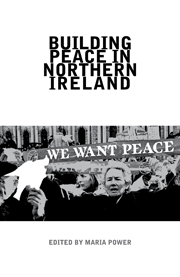Book contents
- Frontmatter
- Contents
- Acknowledgements
- Contributors
- 1 Introduction: Peacebuilding in Northern Ireland
- 2 Understanding the Role of Non-aligned Civil Society in Peacebuilding in Northern Ireland: Towards a Fresh Approach
- 3 The Role of Civil Society in Promoting Peace in Northern Ireland
- 4 The Contribution of Integrated Schools to Peacebuilding in Northern Ireland
- 5 Providing a Prophetic Voice? Churches and Peacebuilding, 1968–2005
- 6 ‘Peace Women’, Gender and Peacebuilding in Northern Ireland: From Reconciliation and Political Inclusion to Human Rights and Human Security
- 7 Encumbered by Data: Understanding Politically Motivated Former Prisoners and the Transition to Peace in Northern Ireland
- 8 Loyalism and Peacebuilding in the 2000s
- 9 Civil Society, the State and Conflict Transformation in the Nationalist Community
- 10 Examining the Peacebuilding Policy Framework of the Irish and British Governments
- 11 Building Peace and Crossing Borders: The North/South Dimension of Reconciliation
- 12 Peace Dividends: The Role of External Aid in Peacebuilding
- Index
2 - Understanding the Role of Non-aligned Civil Society in Peacebuilding in Northern Ireland: Towards a Fresh Approach
- Frontmatter
- Contents
- Acknowledgements
- Contributors
- 1 Introduction: Peacebuilding in Northern Ireland
- 2 Understanding the Role of Non-aligned Civil Society in Peacebuilding in Northern Ireland: Towards a Fresh Approach
- 3 The Role of Civil Society in Promoting Peace in Northern Ireland
- 4 The Contribution of Integrated Schools to Peacebuilding in Northern Ireland
- 5 Providing a Prophetic Voice? Churches and Peacebuilding, 1968–2005
- 6 ‘Peace Women’, Gender and Peacebuilding in Northern Ireland: From Reconciliation and Political Inclusion to Human Rights and Human Security
- 7 Encumbered by Data: Understanding Politically Motivated Former Prisoners and the Transition to Peace in Northern Ireland
- 8 Loyalism and Peacebuilding in the 2000s
- 9 Civil Society, the State and Conflict Transformation in the Nationalist Community
- 10 Examining the Peacebuilding Policy Framework of the Irish and British Governments
- 11 Building Peace and Crossing Borders: The North/South Dimension of Reconciliation
- 12 Peace Dividends: The Role of External Aid in Peacebuilding
- Index
Summary
The last 30 years of the twentieth century saw the most intense violent conflict over national identity in Northern Ireland experienced anywhere in Europe during those years. Over 3,500 people were killed and about 48,000 injured. The social and economic costs were formidable, exemplified by high levels of spatial and social segregation between Protestants and Catholics, matched by deep distrust, and significant levels of poverty and gross inequalities in wealth and income. Northern Ireland is among the most unequal regions in Europe.
By the 1990s, civil society organisations saw themselves and were seen by government as a vehicle for achieving a peaceful society in Northern Ireland. Beginning in the early 1990s this promise seemed to be a reality. There were a series of self-conscious attempts by government to support the development of, and then engage with, elements within civil society to help manage the conflict, address some of its social consequences, and help to build the peace. Once the power-sharing government was formed in the wake of the 1998 ‘Good Friday’ Agreement, however, the significance and influence of civil society organisations declined. The decline is a puzzle since both social theory and government policy in the UK suggest that if civil society organisations are strong, they will play an important role in governance and also in furthering community integration.
That this has not happened, we believe, shows a misunderstanding of the roles civil society organisations may play in national politics and of the significance of civil society organisations as primary actors shaping society.
- Type
- Chapter
- Information
- Building Peace in Northern Ireland , pp. 18 - 36Publisher: Liverpool University PressPrint publication year: 2011
- 3
- Cited by

